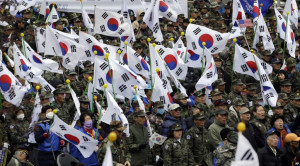
Recall that the Saenuri parliamentary faction initiated a bill to expand the powers of the National Assembly, which deprived the president of his powers to a great degree, virtually turning the presidential republic into a parliamentary system. The National Assembly passed the bill, but the President imposed a “veto” on it, and when the bill was sent back to the parliament, ‘explanatory work’ had already been carried out with the deputies, whereby, for this current parliament’s remaining term, this law could not be discussed any further.
However, this is not the only event that shows that the conservatives are on the offensive. Firstly, there is the appointment of a new Prime Minister, who belongs to the more conservative group of the ruling party than Park Geun-hye.
After the last government crisis in 2014, when, as a result of not proven accusations of corruption Prime Minister Lee Yong-Gu resigned, Park Geun-hye ran out of her “benched extras,” and the former Minister of Justice, Hwang kyo An, who belonged to a conservative faction and was known for his role in the liquidation of the United Progressive Party, became the new prime minister.
However, if Parliament was extremely picky in its consideration of Pak’s appointees, whereby any potential stain on their reputation would be an occasion for media hype as a result of which the politician would be forced to disqualify himself, in this case the situation was exactly the opposite. He did not serve in the military? The visiting military doctor confirmed that there was a legitimate medical reason; and any discussion about a bribe is out of the question. As a prosecutor, he halted the investigation of the sensational corruption case? No problem, the statute of limitations on the case had ended anyway. And so on and so forth in the same spirit, until the Prime Minister was approved by 156 votes to 120.
Secondly, there is a sudden turn of events in the case of the convicted head of the National Intelligence Service. Lee Myung-bak’s trustee, who was involved in raising funds for his election campaign, was untouchable during the reign of the former president, despite the completely fantastic failures of his department. Why, just recall the big story, when, during a visit of the Indonesian delegation, three agents tried to steal a diplomat’s laptop, but were caught in the act by the hotel security.
Much can be told about the fabrication of cases and about the history of “trolls in uniform” when under the direct orders of superiors, agents waged war with the left wing in forums and in social networks. In the end, Won Sei-hoon was convicted for both incompetence and corruption. But suddenly, it turns out that there is insufficient evidence.
Recall, that previously the National Intelligence Service (NIS) and the Defense Security Command (DSC) of the Ministry of Defense had been caught in the fact that they had tried to influence the outcome of the presidential elections in 2012. It came down to arrests, and the former head of the NIS received a prison sentence.
Thirdly, there are a few decisions of the Constitutional Court, significantly reinforcing the National Security Law. Now, for example, when discussing political topics on the Internet, citizens are required to indicate open access to their personal data, and the mere fact of storing Kim Il-sung’s memoirs or other “extremist” materials in their computer memory makes the computer owner a target for criminal prosecution. He will have to prove that he does not circulate this data. By default, the chain looks like this: if you are not an employee of the organization, officially fighting with North Korea, possession of these North Korean materials means only one thing – you are a secret supporter of the “anti-state organization».
Along with this, also, is another scandal associated with the use by special services of spyware software and the attempt to introduce a new history textbook, in which the anti-communist and anti-leftist trend has already caused mass protests among professors
Even aggravation of inter-Korean relations, related to the incident in the Demilitarized Zone (DMZ), can be added to the treasury of facts, because only DPRK’s very harsh reaction prevented the anti-North Korean propaganda on the (DMZ) from resuming.
All of this raises the question of how, during her remaining term, Park Geun-hye will be able to successfully implement those elements of her program that distinguishes it from that of conservatives, such as Lee Myung-bak. After all, she has already been in power for half a term, but, according to experts, has not strengthened her position enough and, therefore, is often forced to negotiate with the representatives of the opposing forces, constantly finding herself caught between two fires. For the right-wing – she is too left, and for the left-wing – she is too right, even if only because she is President Park Chung Hee’s daughter, and discussions around her role in the contemporary Republic of Korea are very similar to the discussions about Stalin’s role in Russia. The left-wing, a priori withholds support, seeing in the daughter a clone of her father and holds her responsible for all the policy of the Right-wing.
In all likelihood, the Conservatives hope that sooner or later, Park Geun-hye, will either overstrain herself, or will be forced to move to the right-wing – at least to strengthen her own position. In the author’s opinion, this has not happened yet, as evidenced, for example, by her visit to Beijing, which she made, despite the protests from the right-wing. Therefore, we continue to monitor the South Korean political situation, which so often is reminiscent of a dramatic soap opera.
Konstantin Asmolov, Ph.D, Chief Research Fellow of the Center for Korean Studies, Institute of Far Eastern Studies, Russian Academy of Sciences, especially for the online magazine “New Eastern Outlook”
